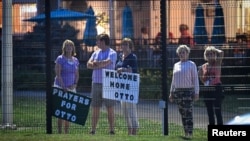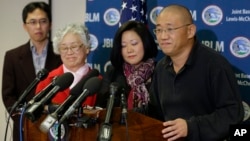Court Papers Hint at Warmbier’s Treatment in North Korea (original) (raw)
Declarations filed in support of a lawsuit filed by the parents of Otto F. Warmbier, the University of Virginia student who died after returning to the U.S. from 17 months in captivity in Pyongyang, may raise new questions about how the college student was treated while in North Korea.
Warmbier, a 22-year-old American, traveled to North Korea in December 2015 and was taken into custody by North Korean officials at the airport Jan. 2, 2016. He was accused of stealing a poster from his hotel and sentenced to 15 years of hard labor in March 2016. Warmbier died June 13, 2017, shortly after being returned to the United States in a coma.
Otto Warmbier’s parents, Fred and Cindy Warmbier, have filed a lawsuit against the Democratic People’s Republic of Korea.
“It is unbelievable to me that North Korea would send Otto home as a vegetable, with scars on his body and crooked teeth,” Fred Warmbier said in his declaration to a U.S. federal court Oct. 10 in support of a lawsuit he filed with his wife.

Fred Warmbier, right, listens as Cindy Warmbier speaks of their son Otto Warmbier, an American who died last year, days after his release from captivity in North Korea, May 3, 2018, at the U.N.
The lawsuit was filed in the U.S. District Court for the District of Columbia against North Korean Foreign Minister Ri Yong Ho. The lawsuit charged the North Korean government with “hostage taking, illegal detention, torture and killing of a young American tourist” in order “to extract various concessions from the United States government.”
Claims of being beaten
In the complaint filed in April, the Warmbiers, who live in Wyoming, Ohio, claimed their son had been intentionally beaten.
“Physically, he returned destroyed in a state of unresponsive wakefulness with a devastating brain injury; he also had a large scar on his left foot and traumatic dental injuries, all of which resulted from North Korea’s torture,” the complaint stated.

A person believed to be Otto Warmbier is transferred from a medical transport airplane to an awaiting ambulance at Lunken Airport in Cincinnati, Ohio, June 13, 2017.
North Korea has denied torturing Warmbier.
Declarations from his pediatric dentist and the dentist he transferred to as an adult, suggest otherwise, as does a declaration filed by the neurologist who led Otto Warmbier’s care upon his return from North Korea. On Saturday, a day after VOA Korean reported on the declarations, North Korea replied with “indignation” to suggestions in the latest court filings that Warmbier may have been tortured.
“I remember Otto as having straight teeth without any significant misalignment or crowding,” said Dr. Murray Dock, a pediatric dentist in Cincinnati, Ohio, who was Otto Warmbier’s dentist between 2011 and 2013.
After reviewing post-mortem dental images, Dock stated in his declaration that he “observed substantial differences in the positions of Otto’s … bottom four middle-most teeth.” The teeth were “moved backwards towards the tongue, in comparison to his teeth before he traveled to North Korea. This sort of change would most typically be caused by some sort of impact. Nothing in my treatment of Otto would have led me to expect this sort of change as a result of natural occurrence.”
Warmbier’s dentist between 2014 and 2015, Todd Williams, also of Cincinnati, Ohio, declared “Otto had excellent teeth” with an excellent “bite” between the upper and lower teeth. But upon review of the Warmbier’s post-mortem dental images, Williams declared that some of his patient’s bottom teeth were “positioned towards the back of his mouth. In my professional opinion, some force was obviously applied to them after his May 27, 2015, appointment. There is also evidence ... indicating a loss of bone. This is very unusual for a previously healthy young dental patient.”

FILE - Local residents hold signs of support to welcome home Otto Warmbier at Lunken Airport in Cincinnati, Ohio, June 13, 2017.
Neurologist’s declaration
And a declaration filed by Daniel Kanter, the neurologist who was the lead physician for Otto Warmbier upon his return at the University of Cincinnati Medical Center, said Otto died of severe brain damage resulting from being deprived of oxygen, which was caused by “the sustained cessation of blood flow to the brain” for “about five to 20 minutes. Because the injury was so extensive, it was unlikely that Mr. Warmbier was with medical personnel who were willing and able to intervene to resuscitate him when the injury occurred.”
It remains unclear how Otto Warmbier was deprived of oxygen.
The director of Pyongyang’s Friendship Hospital said in a report released on Saturday by the Korean Central News Agency (KCNA), North Korea’s official mouthpiece, that Warmbier was “undergoing the reform through labor that he had been sentenced to" before he was returned to the United States. KCNA did not name the director.
The KCNA report said “several American doctors reportedly involved in the health checkup and treatment of Warmbier submitted ‘medical observation’ to a federal district court in Washington, D.C., on October 10 to the effect that ‘he had died of torture,’ alleging that ‘they had concluded his teeth were dislocated and his gum bone damaged by physical force from outside.’
“As the director of the hospital directly involved in medical treatment of Warmbier, I cannot repress my indignation over the American total distortion of the truth regarding his death,” the report said.
The Warmbiers are holding North Korea liable for “economic and noneconomic compensatory damages” for the suffering of their son and their own. The couple seeks damages in an amount to be determined by the court.
Financial losses incurred by Otto Warmbier and his parents are estimated to range between 1,993,386and1,993,386 and 1,993,386and6,038,308, according to an expert statement submitted to the court by James V. Koch, an economics professor at Old Dominion University.
Koch estimated the minimum amount of damages based on the average salaries of University of Virginia graduates and the maximum amount based on what Otto Warmbier would have earned if he had followed his intended career path to Wall Street.
Private citizens are not allowed to sue foreign governments under American law. However, because the Trump administration re-instated North Korea to the state sponsors of terrorism list in November 2017, the Warmbiers could sue North Korea as citizens injured in acts of state-sponsored terrorism may take legal actions against countries on the list.
If the court rules in favor of the Warmbiers, they may be awarded compensatory damages from the U.S. Victims of State Sponsored Terrorism Fund.
The summons to the foreign minister was sent from Washington in May via the international shipping company DHL and delivered to Pyongyang in June. The receipt was signed by “Kim.”
Shortly after Otto Warmbier returned to the U.S., but before he died, a senior American official said the United States had obtained intelligence reports stating that Otto Warmbier had been beaten repeatedly, according to a New York Times article.

FILE - Dr. Lakshmi Kode Sammarco speaks during a news conference regarding the circumstances surrounding the death of 22-year-old University of Virginia undergraduate student Otto Warmbier who was serving a 15-year prison term in North Korea, Sept. 27, 2017.
Coroner’s report
After Otto Warmbier’s death, Dr. Lakshmi Kode Sammarco, the Hamilton County, Ohio, coroner, found no evidence that Otto Warmbier had been tortured.
During a press conference in September 2017, Sammarco said, “There was no evidence of trauma to the teeth,” and the post-mortem report filed in the same month said “the teeth are natural and in good repair.”
The report, signed by Dr. Gretel Stephens, deputy coroner for Hamilton Country, said Otto Warmbier died of “complications of chronic anoxic/ischemic encephalopathy due to unknown insult more than a year prior to death,” but concluded the manner of his death as “undetermined.”
Anoxic-Ischemic encephalopathy is medical terminology for brain damage resulting from the lack of oxygen fed into the brain by the blood stream.
In interviews with VOA Korean Service, former American detainees in North Korea have said they were subject to harsh treatment but denied being physically tortured.

FILE - Family members watch as Kenneth Bae, right, freed during a top-secret mission, talks to reporters after he arrived at Joint Base Lewis-McChord, Washington, Nov. 8, 2014.
Kenneth Bae, a Korean-American Christian missionary who was detained in North Korea in 2012 said, “I was not treated with force.” Bae was accused of conducting “hostile acts” against the government before being released in 2014.
“There was no physical [force] used on me,” Bae said. “But they used psychological tactics, saying that I could not go home and that I will be held for 15 years.”
Jeffrey Fowle, a father of three children in Ohio, was detained in North Korea for six months for leaving a Bible in a restaurant in Pyongyang during his tour of the country in 2014.
Fowle said, “At one point ... [I was told I was not as] forthcoming as I should have been with my answers and [was asked], ‘Would you like to be transferred to a place where conditions might be harsher?’“
The U.S. imposed a travel ban on North Korea following Otto Warmbier’s death in June 2017.
Christy Lee and Ahn So-young contributed to this report which originated on VOA Korean.